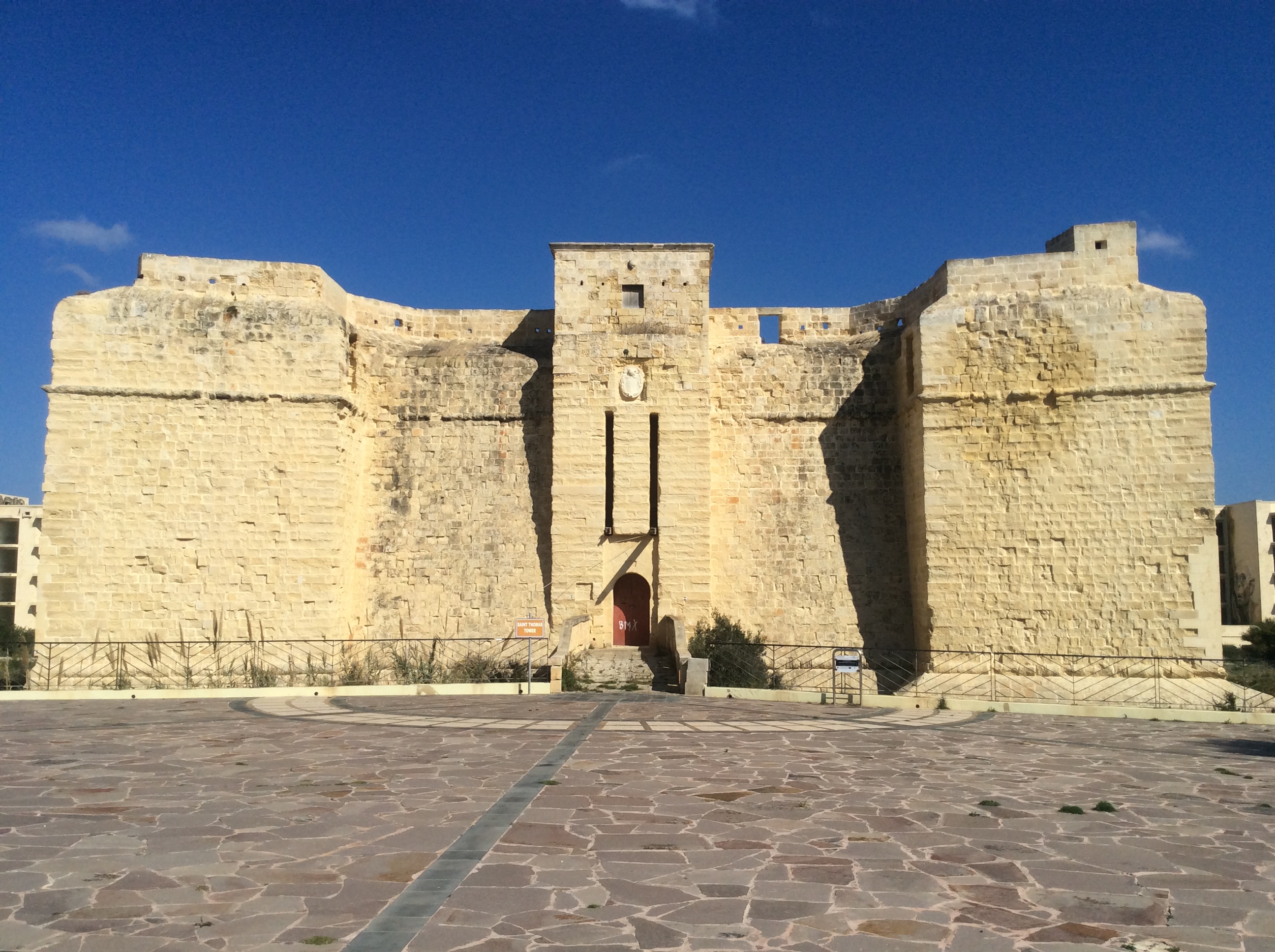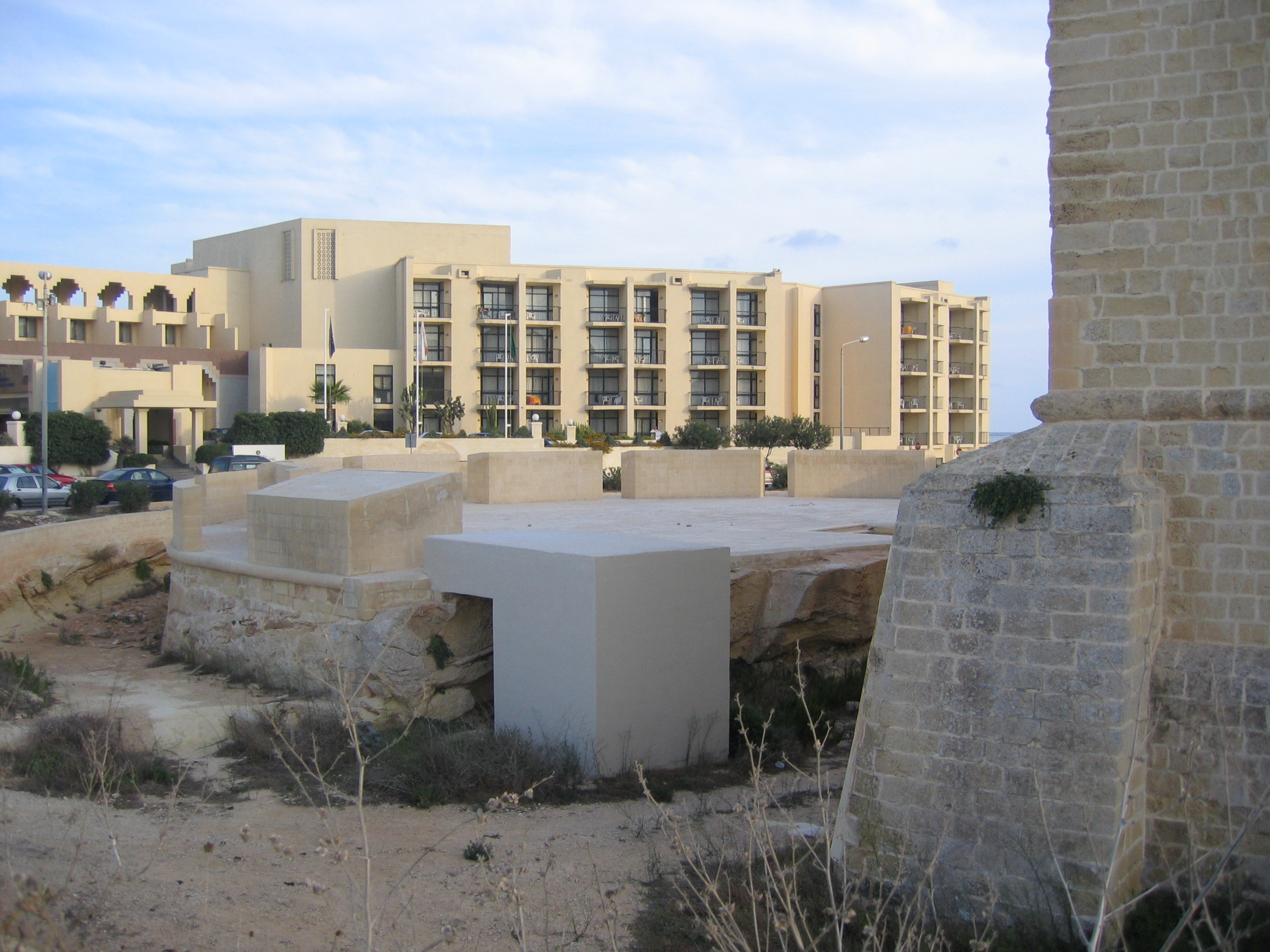Saint Thomas Tower on:
[Wikipedia]
[Google]
[Amazon]
Saint Thomas Tower ( mt, Torri ta' San Tumas), also known as Fort Saint Thomas ( mt, Forti San Tumas), is a large bastioned
 The tower has very thick walls and has four pentagonal bastioned turrets projecting outwards on each corner. The tower's entrance was through a vaulted doorway with a wooden drawbridge. The drawbridge is still partially intact and it is the only original one to have survived in Malta. The tower is surrounded by a rock-hewn ditch.
After the
The tower has very thick walls and has four pentagonal bastioned turrets projecting outwards on each corner. The tower's entrance was through a vaulted doorway with a wooden drawbridge. The drawbridge is still partially intact and it is the only original one to have survived in Malta. The tower is surrounded by a rock-hewn ditch.
After the  The tower remained in use by the British until the 19th century. The British did not make any major alterations to the tower (like they did in Saint Lucian Tower), and only some minor changes to the structure were made. At some point, the tower was also used as a prison.
The tower remained in use by the British until the 19th century. The British did not make any major alterations to the tower (like they did in Saint Lucian Tower), and only some minor changes to the structure were made. At some point, the tower was also used as a prison.
 Today, the town of Marsaskala has expanded, surrounding the tower with modern buildings. In 1982, the four-star
Today, the town of Marsaskala has expanded, surrounding the tower with modern buildings. In 1982, the four-star
Draw-bridge at Fort St. Thomas studied
National Inventory of the Cultural Property of the Maltese Islands
{{Batteries in Malta Wignacourt towers Batteries in Malta Defunct prisons in Malta Defunct restaurants in Malta Buildings and structures completed in 1614 Military installations established in 1715 National Inventory of the Cultural Property of the Maltese Islands 1614 establishments in Malta 1715 establishments in Malta Buildings and structures in Marsaskala
watchtower
A watchtower or watch tower is a type of fortification used in many parts of the world. It differs from a regular tower in that its primary use is military and from a turret in that it is usually a freestanding structure. Its main purpose is to ...
in Marsaskala
Marsaskala ( mt, Wied il-Għajn), also written as Marsascala and abbreviated as M'Skala, is a seaside town in the South Eastern Region of Malta which has grown around the small harbour at the head of Marsaskala Bay, a long, narrow inlet also kno ...
, Malta
Malta ( , , ), officially the Republic of Malta ( mt, Repubblika ta' Malta ), is an island country in the Mediterranean Sea. It consists of an archipelago, between Italy and Libya, and is often considered a part of Southern Europe. It lies ...
. It was built in 1614, the third of six Wignacourt towers
The Wignacourt towers ( mt, Torrijiet ta' Wignacourt) are a series of large coastal watchtowers built in Malta by the Order of Saint John between 1610 and 1620. A total of six towers of this type were constructed, four of which survive.
Backgr ...
. An artillery battery was added to the tower in the early 18th century. Saint Thomas Tower is the largest watchtower in Malta.
History
Saint Thomas Tower was built above the shore on the seaward face of the headland of ''il-Ħamrija'' inMarsaskala
Marsaskala ( mt, Wied il-Għajn), also written as Marsascala and abbreviated as M'Skala, is a seaside town in the South Eastern Region of Malta which has grown around the small harbour at the head of Marsaskala Bay, a long, narrow inlet also kno ...
. It is a substantial fortification intended to prevent the landing of troops in the sheltered anchorages of Marsaskala Creek and St Thomas' Bay. Construction of the tower was approved in July 1614, at the time of the Raid on Żejtun, in which an Ottoman fleet managed to land at St Thomas' Bay. The tower was named after a chapel dedicated to St Thomas, which stood close to where the tower now lies. It cost 13,450 scudi
The ''scudo'' (pl. ''scudi'') was the name for a number of coins used in various states in the Italian peninsula until the 19th century. The name, like that of the French écu and the Spanish and Portuguese escudo, was derived from the Latin ''s ...
, 6 tarì
A tarì (from Arabic طري ''ṭarī'', lit. "fresh" or "newly minted money") was the Christian designation of a type of gold coin of Islamic origin minted in Sicily, Malta and Southern Italy from about 913 to the 13th century.
History
In th ...
and 4 grani to build, making it the second most expensive Wignacourt tower, after Saint Mary's Tower.
The tower's architect is unknown. There are claims that it was designed by Vittorio Cassar
Vittorio Cassar ( mt, Vitor Cassar, 1550 – 1609), born Gio Vittorio Cassar, was a Maltese architect and military engineer. The son of the renowned architect Girolamo Cassar, he was admitted as a knight within the Order of St. John in 1587. H ...
, but these are disputed, since Cassar was probably dead when work on the tower began.
 The tower has very thick walls and has four pentagonal bastioned turrets projecting outwards on each corner. The tower's entrance was through a vaulted doorway with a wooden drawbridge. The drawbridge is still partially intact and it is the only original one to have survived in Malta. The tower is surrounded by a rock-hewn ditch.
After the
The tower has very thick walls and has four pentagonal bastioned turrets projecting outwards on each corner. The tower's entrance was through a vaulted doorway with a wooden drawbridge. The drawbridge is still partially intact and it is the only original one to have survived in Malta. The tower is surrounded by a rock-hewn ditch.
After the De Redin towers
The De Redin Towers ( mt, Torrijiet ta' De Redin) are a series of small coastal watchtowers built in Malta by the Order of Saint John between 1658 and 1659. Thirteen towers were built around the coast of mainland Malta, eight of which still surv ...
were built, St Thomas had Żonqor and Xrobb l-Għaġin Towers in its line of sight, but these are now either in ruins or completely demolished.
In 1715, St Thomas Tower was reinforced by the addition of a battery on the seaward face. Construction of the battery cost a total of 382 scudi, 8 tarì, 11 grani and 1 piccolo, which was less than the cost of construction of other batteries around the coast.
During the French blockade of 1798–1800, the tower was stormed and captured by Maltese insurgents.
 The tower remained in use by the British until the 19th century. The British did not make any major alterations to the tower (like they did in Saint Lucian Tower), and only some minor changes to the structure were made. At some point, the tower was also used as a prison.
The tower remained in use by the British until the 19th century. The British did not make any major alterations to the tower (like they did in Saint Lucian Tower), and only some minor changes to the structure were made. At some point, the tower was also used as a prison.
Present day
 Today, the town of Marsaskala has expanded, surrounding the tower with modern buildings. In 1982, the four-star
Today, the town of Marsaskala has expanded, surrounding the tower with modern buildings. In 1982, the four-star Corinthia
Corinthia ( el, Κορινθία ''Korinthía'') is one of the regional units of Greece. It is part of the modern regions of Greece, region of Peloponnese (region), Peloponnese. It is situated around the city of Corinth, in the north-eastern part ...
Jerma Palace Hotel
The Jerma Palace Hotel is a former four-star hotel in Marsaskala, Malta. It was opened as a Libyan investment in 1982, and was managed by Corinthia Hotels International. It was the largest hotel in southern Malta until it closed down in 2007. Th ...
was built between the tower and the coast, effectively ruining the tower's relation with the sea. The hotel closed in 2007, and it is now in a dilapidated state.
Meanwhile, the tower itself now forms the centerpiece of a plaza around its shoreward face. For some time, it was used as a restaurant and pizzeria
A pizzeria is a restaurant focusing on pizza. As well as pizza, dishes at pizzerias can include kebab, salads and pasta.
Many pizzerias offer take-away, where the customer orders their food either in advance or at the restaurant and then t ...
. In 2008, it was handed over to Fondazzjoni Wirt Artna, a heritage foundation. A couple of weeks after it was handed over, the tower was cleaned of debris, and some modern structures which had been added when it was a restaurant were removed. Further restoration work was undertaken by the Restoration Unit. Plans were made to open the tower as a museum about piracy in the Mediterranean, but it has not opened yet.
The battery's gun platform was also restored, and its parapet
A parapet is a barrier that is an extension of the wall at the edge of a roof, terrace, balcony, walkway or other structure. The word comes ultimately from the Italian ''parapetto'' (''parare'' 'to cover/defend' and ''petto'' 'chest/breast'). ...
and embrasures
An embrasure (or crenel or crenelle; sometimes called gunhole in the domain of gunpowder-era architecture) is the opening in a battlement between two raised solid portions ( merlons). Alternatively, an embrasure can be a space hollowed ou ...
were rebuilt to a design on modern interpretative lines.
In 2014, the Marsaskala Local Council organized exhibitions, re-enactments and other events in the tower to commemorate its 400th anniversary.
In popular culture
*The tower is featured in the fiction book ''Il-Misteru tat-Torri San Tumas'' (The Mystery of Saint Thomas Tower) by Charles Zarb published in 2004.Further reading
Draw-bridge at Fort St. Thomas studied
References
External links
National Inventory of the Cultural Property of the Maltese Islands
{{Batteries in Malta Wignacourt towers Batteries in Malta Defunct prisons in Malta Defunct restaurants in Malta Buildings and structures completed in 1614 Military installations established in 1715 National Inventory of the Cultural Property of the Maltese Islands 1614 establishments in Malta 1715 establishments in Malta Buildings and structures in Marsaskala